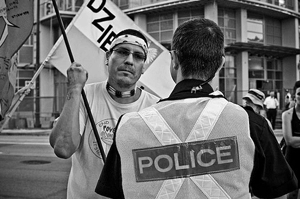
Just six of us flew from Salt Spring Island to Vancouver early last Friday morning. But it took eight government officials and a special security-screening bus to ensure that we did not pose a threat to the 2010 Olympic Winter Games.
Our luggage was x-rayed, we were sent through a metal detector and then checked again with a wand, patted down for good measure. A RCMP officer scrutinized the inside of the float plane with a flashlight before we climbed on board. Although it cost me just $87 to fly across the Georgia Strait, it cost the Canadian taxpayer thousands of dollars.
The temporary screening on Salt Spring Island is part of a nearly $1 billion effort intended to protect the heads of state, corporate executives and other assorted dignitaries descending on Vancouver for what could, as a result, be called the Security Games.
A decade of overreaction
Vancouver was selected as the host city less than two years after the 9-11 terrorist attacks on New York City and Washington, D.C. It was a period of fear and uncertainty, especially in the United States. The Bush administration overreacted, curtailing civil liberties at home while launching two wars and a program of torturing suspected terrorists abroad.
The Canadian government reacted too, but not because it feared terrorist attacks on Canadian soil. Rather, the overriding concern was that Americans, perceiving Canada an easy point of entry for terrorists seeking to infiltrate the United States, would impose border controls that would damage Canada's export-based economy. Billions of dollars were spent on border security, and on increasing the size and effectiveness of the Canadian Forces, Royal Canadian Mounted Police and Canadian Security and Intelligence Service. The Department of Public Safety and Emergency Preparedness was created to mirror the new Department of Homeland Security in the United States. Civil liberties also took a beating, with information on Canadian citizens like Maher Arar being shared freely with U.S. officials, and security certificates being used to detain non-citizens without charge.
It was in this context that the planning for the 2010 Winter Olympics took place, with the security services identifying every conceivable means by which terrorists might strike, and with politicians -- and through them, taxpayers -- willing to foot increasingly large bills.
Misplaced spending
The screening of float-plane commuters is just one of the resulting excesses. Scuba divers are patrolling Vancouver Harbour, guarding against a James Bond-style attack. Soldiers are camped in the backcountry near Whistler, on the lookout for terrorists on snowshoes or skis. Canadian Forces fighter jets are in the skies, ready to shoot down any hijacked plane, while frigates lurk offshore.
Many cities have an inflated sense of self-importance. Yet Vancouver, as a target for international terrorism, simply doesn't have the cachet of London, New York City or Washington, D.C. The 2010 World Cup in South Africa offers far greater global prominence in a less organized place.
Nor are terrorists stupid. They know about the nearly $1 billion security budget and are, as a result, more likely to strike elsewhere. Police forces across Canada will be operating on skeleton-staffs this month -- because thousands of their officers are working the Games.
Most tragically, hundreds of millions of dollars have been wasted that could instead have been spent addressing some clear and present problems -- including a homelessness crisis, underfunded healthcare system, and hundreds of earthquake-vulnerable schools.
It's too late to recoup the money, but it's not too late to prevent another, potentially negative consequence of the security overload.
For as the threat assessments have decreased -- to the point where even the Integrated Security Unit (ISU) admits the terrorist risk is "low" -- all the planning and spending has become a solution in search of a problem. As a result, the threat from domestic actors has been given greater prominence than it deserves.
Protests no surprise
We can expect protests during the Winter Olympics, since the presence of the global media offers a prime opportunity for opinions to be heard. Poverty, homelessness, the plight of indigenous peoples and Canada's record on climate change might figure among the protesters' concerns.
The first big protest will occur on Friday, Feb. 12, when thousands of people will march from the Vancouver Art Gallery to B.C. Place Stadium, just as ticket-holders arrive for the Opening Ceremony. The ceremony could be delayed, causing embarrassment for Olympic organizers.
But instead of being concerned, we should celebrate that our fellow citizens are able to express their views on the world stage. The rights to free assembly and peaceful protest are fundamental to democratic societies. Most people would agree; it's better to live in a free society, with all the messiness it entails, than in the stifling grasp of a police state where conformity is a survival skill.
Although most of the protestors will respect the law, a few might not. Nobody should be surprised if someone throws paint on the Olympic Clock, impedes traffic, breaks a window or unfurls a banner from a bridge. One does not encourage or excuse such acts by anticipating them.
The ISU will also have anticipated such acts, and that is them doing their job. Good planning can reduce the risk of an overreaction, whereby police in riot gear are sent to shut down an otherwise peaceful protest, or sweeping arrests are made in response to the actions of a few.
Primed to escalate?
But planning combined with the need to justify nearly $1 billion in spending can also lead to overestimating the risks. Bud Mercer, the RCMP officer who heads up the ISU, has taken to showing people a newsletter produced by a fringe group that encourages violent protest. Mercer has, in the past, been involved in heavy-handed action against First Nations, environmental and human rights protestors. In 1997, during an Asia-Pacific Economic Cooperation (APEC) summit on the University of British Columbia campus, he was among the RCMP officers who pepper-sprayed students protesting the presence of Indonesia President Suharto.
One quiet evening last spring, another group of RCMP officers arrested a handful of UBC students after they had built a bonfire out of a shipping pallet while protesting a construction project on campus. The officers also threatened to Taser the students -- a threat that carried particular menace in the aftermath of police brutality against Robert Dziekański, a 40-year-old Polish immigrant who died at Vancouver Airport after being Tasered five times by the RCMP.
If all is going well, the Vancouver Police Department will handle all citizen-police interactions within the borders of the City of Vancouver during the Olympics. The VPD has more experience than the RCMP in working with rather than against protestors, with peaceful protests occurring on an almost weekly basis throughout the year. But the VPD could call for help -- or the ISU could decide to intervene -- if some protestors behave illegally.
The presence of RCMP or even Canadian Forces personnel on the streets could trigger new protests, transforming a situation where few, if any, lives were at risk into a repeat of the Battle of Seattle in 1999.
Tell the police to keep cool
When Doug Ward of the Vancouver Sun asked Alissa Westergard-Thorpe of the Olympic Resistance Network whether any protestors would try to breach the security perimeter around B.C. Place Stadium on February 12, she replied: "That really depends on what type of police repression we face during the day. You know if we have a day where we're being beaten back by the police when we're simply trying to march, people's tempers can get high."
It is even possible that some of the police, having spent years anticipating and preparing for trouble, might be tempted to instigate it. At a NAFTA summit in Montebello in August 2007, undercover Quebec provincial police officers were exposed posing as protestors. The police were wearing bandanas over their faces, one of them was carrying a rock, and the whole thing was captured on video. Although the ISU has taken a number of steps to accommodate civil liberties concerns during the planning process, it only committed to not use agent provocateurs after sustained pressure was applied by the B.C. Civil Liberties Association.
The authorities must not be allowed to ramp up their security machine in response to small or isolated illegalities. They need to hear -- from politicians and citizens -- that we expect them to exercise the utmost restraint. We castigate, with good reason, the treatment of protesters in Iran and other countries. It would be unfortunate if the activities of a few police or soldiers were to tar Canada with the same brush.
Again, protests are about far more than security. At their core, they are about the relationship between citizens and the state. Those who wish to protest peacefully must be allowed to do so, regardless of what others might do. ![]()
Read more: 2010 Olympics, Rights + Justice















Tyee Commenting Guidelines
Comments that violate guidelines risk being deleted, and violations may result in a temporary or permanent user ban. Maintain the spirit of good conversation to stay in the discussion.
*Please note The Tyee is not a forum for spreading misinformation about COVID-19, denying its existence or minimizing its risk to public health.
Do:
Do not: